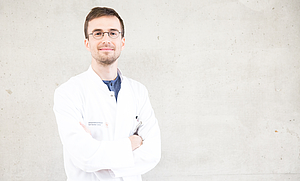1. What exciting topics are you currently working on?
We are currently working on a quite new pathomechanism in neurodegenerative diseases: malfunction of bulk lipid transfer at membrane contact sites. Rare hereditary Parkinson's or Chorea syndromes belong to the spectrum of related disorders.
2. How would you summarise your career path?
I am a Clinician Scientist at the Department of Neurology and the Section for Translational Neurodegeneration Albrecht Kossel in the group of Prof. Andreas Hermann. I have benefited a lot from structured Clinician Scientist programs like the one here in Rostock, but also from the Else Kröner Forschungskolleg in Dresden, where I started my career.
3. Where do your best ideas emerge from?
From discussions with nice colleagues.
4. Who or what had or has had the strongest positive influence on your career and work?
Tough question, many things and persons.
5. What do you consider the greatest challenge or hurdle for progress in your field?
There are so many different etiologies and mechanisms involved in neurodegeneration which is why it is so hard to really tackle the root causes of these diseases.
6. What are, in your opinion, the opportunities, directions or decisions that are vital to progress neurosciences?
I think close and good collaborations are quite essential and I am happy that we have such a culture in Rostock with the CTNR and now with the UNC (United Neuroscience Campus Lund - Rostock)!
7. Tell us what would have to happen in your work for you to say “A dream has come true!”?
I think it's a "dream come true" when our work ends up having at least a little bit of a positive impact on the well-being of our patients.
8. What was your greatest experience as a scientist?
Our group organized an international conference on neuroacanthocytosis syndromes some years ago in Dresden. This was one of the greatest experiences as a scientist I had so far.
9. What has been your biggest scientific failure so far, and how do you deal with failed experiments and defeats?
We thought that we have found an quite elegant way to modify the course of a very rare disease, called Chorea-Acanthoctosis/VPS13A disease, by suppressing a tyrosine kinase in the brain. However, such kinase inhibitors actually do not penetrate as well as needed into deep brain structures and we now hope that future drugs will perform better.
10. With which historical person, politician or celebrity would you like to have a dinner and discuss your work?
George Huntington - because he was so excellent at describing individuals with a clinical syndrome that is now named after him.
Dr. Kevin Peikert
Department of Neurology
Translational Neurodegeneration Section "Albrecht Kossel"
University Medicine Rostock

